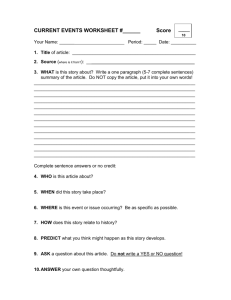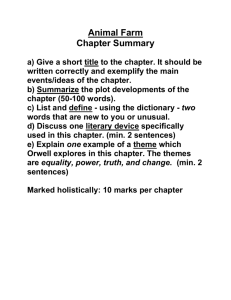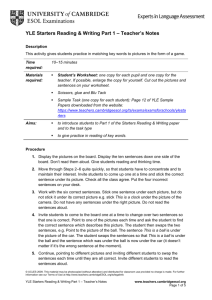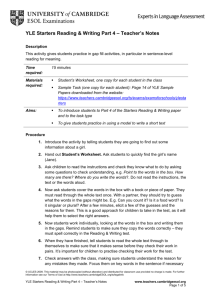YLE Starters Reading & Writing Part 1
advertisement
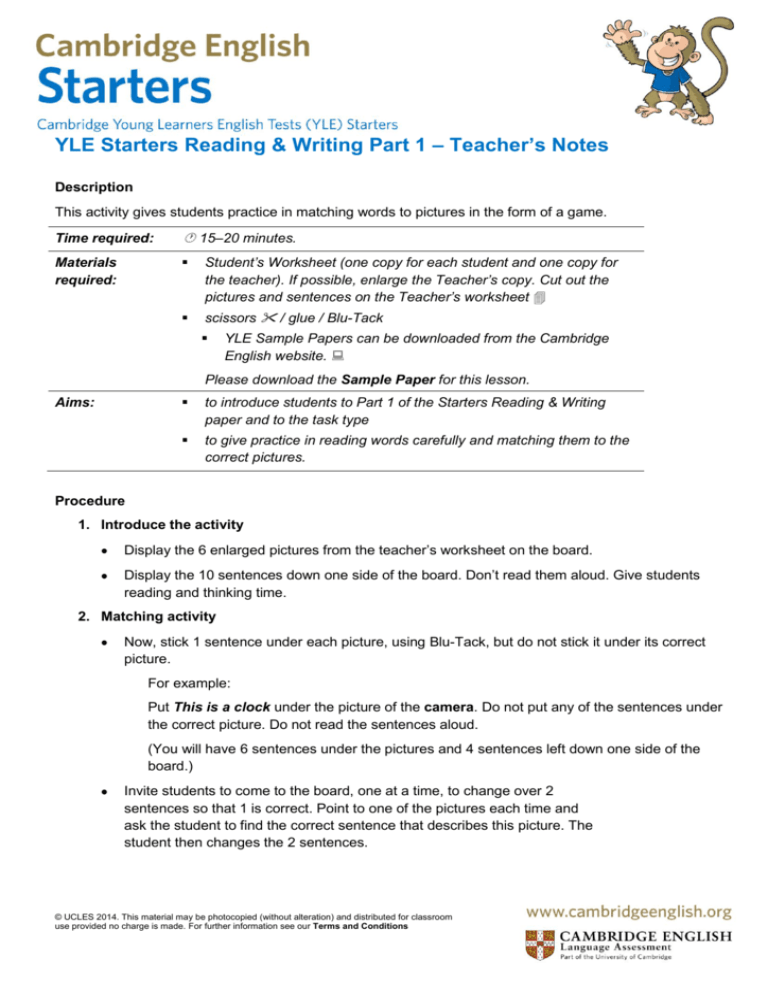
YLE Starters Reading & Writing Part 1 – Teacher’s Notes Description This activity gives students practice in matching words to pictures in the form of a game. Time required: 15–20 minutes. Materials required: Student’s Worksheet (one copy for each student and one copy for the teacher). If possible, enlarge the Teacher’s copy. Cut out the pictures and sentences on the Teacher’s worksheet scissors / glue / Blu-Tack YLE Sample Papers can be downloaded from the Cambridge English website. Please download the Sample Paper for this lesson. Aims: to introduce students to Part 1 of the Starters Reading & Writing paper and to the task type to give practice in reading words carefully and matching them to the correct pictures. Procedure 1. Introduce the activity Display the 6 enlarged pictures from the teacher’s worksheet on the board. Display the 10 sentences down one side of the board. Don’t read them aloud. Give students reading and thinking time. 2. Matching activity Now, stick 1 sentence under each picture, using Blu-Tack, but do not stick it under its correct picture. For example: Put This is a clock under the picture of the camera. Do not put any of the sentences under the correct picture. Do not read the sentences aloud. (You will have 6 sentences under the pictures and 4 sentences left down one side of the board.) Invite students to come to the board, one at a time, to change over 2 sentences so that 1 is correct. Point to one of the pictures each time and ask the student to find the correct sentence that describes this picture. The student then changes the 2 sentences. © UCLES 2014. This material may be photocopied (without alteration) and distributed for classroom use provided no charge is made. For further information see our Terms and Conditions For example: Point to the picture of the ball. The sentence This is a ball is under the picture of the car. The student changes the sentences so that This is a ball is under the ball and the sentence which was under the ball is now under the car. It doesn’t matter if it’s the wrong sentence at the moment. Continue pointing to different pictures and inviting different students to change the sentences each time until they are all correct. Remind students that the sentence they need will either be under a different picture or down the side of the board. Ask different students to read the sentences aloud. Now, take the 4 sentences that are left down the side of the board. Stick 1 under a picture. For example: Put This is a bike under the picture of the tiger. Don’t read the sentence aloud. Ask students Yes or no? They answer No altogether. Finally confirm the correct answers. 3. Student’s Worksheet Hand out a copy of the Student’s Worksheet to each student. Tell them to cut out the 6 pictures and the 10 sentences. Ask the students to play the game in pairs. Remind them that they have to put an incorrect sentence under each picture and that their partner has to change the sentences so that each picture matches the sentence. Monitor the students and help as necessary. 4. Sample Task Hand out a copy of the Sample Task to each student. Remind them to read the instructions and the sentences carefully. Give them 3–5 minutes to do the task. For the Reading & Writing test, it’s important to train students to get used to a limited amount of time for each part, as in the test they need to manage the time themselves. Check answers with the class. © UCLES 2014. This material may be photocopied (without alteration) and distributed for classroom use provided no charge is made. For further information see our Terms and Conditions 5. Important information to give to the students At the end of the activity, tell students that in the test: they have to make their ticks and crosses very clear they must not leave any answers blank. If they are not sure of an answer at the end of the test, they should guess. They may be right and they won’t lose any marks for a wrong answer. Suggested follow-up activities Students stick the 6 pictures in their notebooks using glue. They choose 1 sentence to stick under each picture. They choose some which are correct and some which are incorrect. Then they put a tick or a cross next to the sentence to show if it is correct or not. The games described in Steps 1 and 2 above can be repeated with other sets of sentences and different pictures. This is a good way to revise new language. © UCLES 2014. This material may be photocopied (without alteration) and distributed for classroom use provided no charge is made. For further information see our Terms and Conditions YLE Starters Reading & Writing Part 1 – Answer Key Key to Sample Task © UCLES 2014. This material may be photocopied (without alteration) and distributed for classroom use provided no charge is made. For further information see our Terms and Conditions YLE Starters Reading & Writing Paper 1 – Student’s Worksheet This is a camera. This is a doll. This is an elephant. This is a clock. This is a computer. This is a tiger. This is a car. This is a hat. This is a ball. This is a bike. © UCLES 2014. This material may be photocopied (without alteration) and distributed for classroom use provided no charge is made. For further information see our Terms and Conditions YLE Starters Reading & Writing Part 1 – Sample Task Original can be found in the Cambridge English: Starters Reading & Writing Sample Paper, which can be downloaded from the Cambridge English website. © UCLES 2014. This material may be photocopied (without alteration) and distributed for classroom use provided no charge is made. For further information see our Terms and Conditions © UCLES 2014. This material may be photocopied (without alteration) and distributed for classroom use provided no charge is made. For further information see our Terms and Conditions





